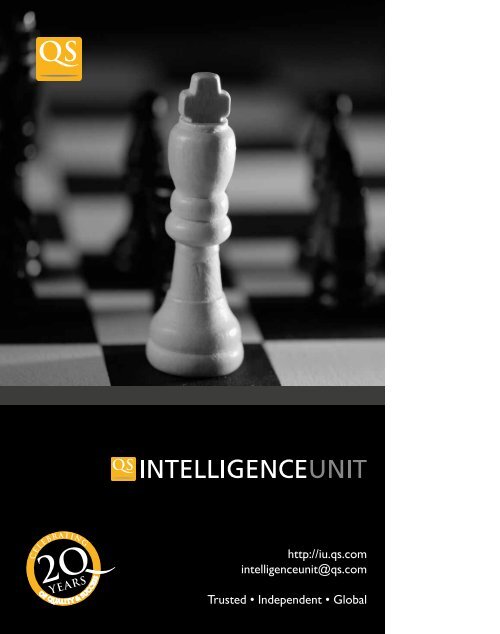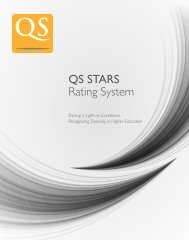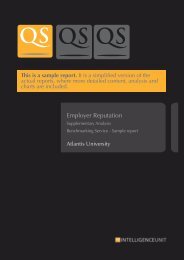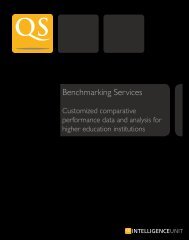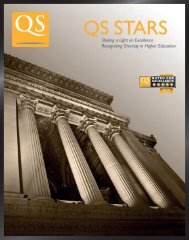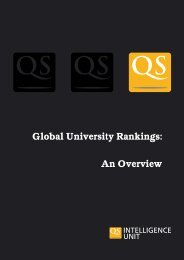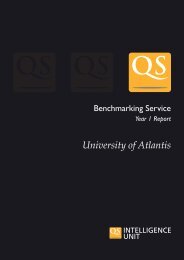QS STAR S - QS Intelligence Unit
QS STAR S - QS Intelligence Unit
QS STAR S - QS Intelligence Unit
Create successful ePaper yourself
Turn your PDF publications into a flip-book with our unique Google optimized e-Paper software.
http://iu.qs.com<br />
intelligenceunit@qs.com<br />
Trusted • Independent • Global
<strong>QS</strong> Quacquarelli Symonds was founded in 1990 and has become established as the world’s leading<br />
network for Higher Education and top careers. Our mission is to enable motivated people around the<br />
world to fulfil their potential by fostering international mobility, educational achievement and career<br />
development.<br />
We segment our product and service offerings into the following four categories, each a market<br />
leader serving our loyal client base:<br />
University – serving over 500 universities at primarily undergraduate level<br />
Graduate – serving over 200 graduate schools and universities<br />
MBA – serving over 420 accredited business schools<br />
Careers – serving over 200 multinational employers<br />
As well as major institutions and government bodies worldwide, over 300 different global media<br />
outlets work closely with us.<br />
Our newspaper, magazine and online partners include:<br />
International<br />
Business Week, Wall Street Journal Asia, International Herald Tribune<br />
America<br />
US News & World Report, Washington Post, Chicago Tribune, LA Times, San Francisco Chronicle, Toronto Star<br />
Europe<br />
The Times, Le Nouvel Observateur, Handelsblatt, Expansion y Empleo, Il Sole 24 Ore, Vedemosti<br />
Asia<br />
Chosun llbo, South China Morning Post, Japan Times, Sina.com, The Times of India<br />
Visit us at www.qs.com
<strong>QS</strong> has been conducting research in a range of<br />
areas since 1990, beginning with a global survey<br />
of MBA employers.<br />
The <strong>QS</strong> World University Rankings ® , the most<br />
well-known research project that <strong>QS</strong> operates,<br />
has been in existence since 2004.<br />
To meet the increasing public interest<br />
for comparative data on universities and<br />
organisations, and the growing demand for<br />
institutions to develop deeper insight into their<br />
competitive environment, the <strong>QS</strong> <strong>Intelligence</strong><br />
<strong>Unit</strong> (<strong>QS</strong>IU) was formed in 2008 as a distinct<br />
and autonomous department.<br />
Commited to the key values of rigorous integrity,<br />
unique insight, and accessible presentation, <strong>QS</strong>IU<br />
strives to be the most trusted independent<br />
source of global intelligence in the Higher<br />
Education sector.<br />
Due to the growing demand for Higher<br />
Education intelligence, <strong>QS</strong>IU is growing both its<br />
London and Singapore operations.<br />
Trusted. Independent. Global.<br />
<strong>QS</strong> <strong>Intelligence</strong> unit
<strong>QS</strong> World University Rankings ®<br />
WORLD<br />
UNIVERSITY<br />
RANKINGS<br />
®<br />
<strong>QS</strong> World University Rankings ® present a multi-faceted view of the relative strengths of the world’s<br />
leading universities.<br />
In 2010, <strong>QS</strong> unveiled new media partnerships around the world, alongside our existing partners US<br />
News & World Report and Chosun Ilbo, we are also pleased to be working with Handelsblatt, Times<br />
of India, Sina.com and Nouvel Observateur.<br />
Methodology<br />
Six indicators are drawn together to form an international ranking of universities:<br />
Academic Peer Review<br />
A global survey of academics asking respondents<br />
to identify universities they consider excellent in<br />
their own broad field of knowledge.<br />
Employer Review<br />
A global survey of employers, with experience of<br />
recruiting from universities, asking respondents<br />
to identify universities they consider to be best<br />
at preparing their graduates for the workplace.<br />
Citations per Faculty Member<br />
Using exported information from Scopus (the<br />
world’s largest abstract and citation database<br />
of research literature operated by Elsevier),<br />
this indicator combines research productivity<br />
and quality, taking into account the scale of an<br />
institution.<br />
Student Faculty Ratio<br />
In lieu of a globally available evaluation of teaching<br />
quality, this indicator is designed to serve as<br />
a widely available proxy for commitment to<br />
teaching.<br />
International Students<br />
The proportion of international students is<br />
used to evaluate not only a university’s broad<br />
approach to internationalization, but also to give<br />
prospective students a feeling for an institution’s<br />
commitment and facilities for students from<br />
overseas.<br />
International Faculty<br />
This indicator supports the previous one in<br />
assessing a university’s commitment to providing<br />
a global educational environment.<br />
Format<br />
<strong>QS</strong> World University Rankings ® can be found online at www.topuniversities.com and in print.<br />
Last year the Rankings were viewed over 18 million times and received coverage in over 700 national<br />
and international newspapers and news portals.
<strong>QS</strong> Asian University<br />
Rankings<br />
The <strong>QS</strong> Asian University Rankings offer a<br />
comprehensive look at Asia’s leading universities.<br />
Whilst a global ranking seeks to identify truly<br />
world class universities, contributing to the global<br />
progress of science, society and scholarship,<br />
the regional ranking adapts to the realities and<br />
complexity of the geographical area in question.<br />
<strong>QS</strong> Asian University Rankings can be found<br />
online at www.topuniversities.com.<br />
ASIAN<br />
UNIVERSITY<br />
RANKINGS<br />
Subject Rankings<br />
<strong>QS</strong> University Subject Rankings look at the<br />
ranking of institutional strength in specific<br />
subject fields.<br />
Rankings in five key subject areas are produced:<br />
Arts & Humanities, Engineering & IT, Life<br />
Sciences & Biomedicine, Natural Sciences and<br />
Social Sciences.<br />
<strong>QS</strong> Subject Rankings can be found online at<br />
www.topuniversities.com from Fall 2010.<br />
TM<br />
<strong>QS</strong> Classifications<br />
In response to the Berlin Principles*, a set of<br />
guidelines and best practices for the ranking<br />
of Higher Education institutions, the <strong>QS</strong><br />
Classifications provide a simple contextual<br />
reference to other evaluation results, categorising<br />
institutions by subject spread, size and research<br />
level. Institutions can thus understand their<br />
position relative to their peers.<br />
Find out how your university would measure up<br />
at www.topuniversities.com.<br />
<strong>QS</strong> SAFE<br />
<strong>QS</strong> SAFE National System Strength Evaluation<br />
takes the ranking results, in concert with other<br />
indicators, not to evaluate the relative strength<br />
of individual institutions, but to analyse countries’<br />
Higher Education system strengths as a whole.<br />
<strong>QS</strong> SAFE takes account of population size,<br />
economic factors, and overall system strength<br />
in order to develop meaningful insights about a<br />
particular geographical area.<br />
More information is available at<br />
www.topuniversities.com.<br />
other projects<br />
* http://www.che.de/downloads/Berlin_Principles_IREG_534.pdf
Benchmarking Service: Year 1 Report – University of Atlantis<br />
Personnel Data Headcount FTE<br />
Faculty: 4,770 2,334<br />
International Faculty: 1,242 641<br />
Students: 45,342 31,572<br />
International Students: 9,404 -<br />
Undergrads: 28,960 23,083<br />
International Undergrads: 5,947 4,490<br />
Postgrads: 15,839 7,326<br />
International Postgrads: 4,508 3,168<br />
Exchange Data Headcount FTE<br />
Undergrads Inbound: 52 40<br />
Undergrads Outbound: 476 188<br />
Postgrads Inbound: 258 198<br />
Postgrads Outbound: 35 18<br />
Financial Data<br />
Domestic Undergraduate Fees: USD 17,077<br />
International Undergraduate Fees: USD 17,077<br />
Domestic Postgraduate Fees: USD 15,195<br />
International Postgraduate Fees: USD 14,622<br />
Average Domestic Fees: USD 17,846<br />
Average International Fees: USD 16,226<br />
Annual Library Spending: USD 10,770,000<br />
Total Research Funding: USD 213,220,000<br />
Government: USD 103,850,000<br />
Industrial: USD 66,300,000<br />
Facilities Investment: USD 181,000,000<br />
Community Investment: US$ -<br />
Alumni Donations: US$ -<br />
Website Capture: 2010-01-18<br />
Institution Name:<br />
University of Atlantis<br />
Abbreviation:<br />
Atlantis<br />
City:<br />
Atlantis<br />
Country:<br />
Newstralia<br />
Foundation Year: 1949<br />
Website:<br />
www.qs.com<br />
Scopus Data<br />
Papers Citations Impact<br />
Overall: 17,473 74,254 4.2<br />
Arts & Humanities: 199 83 0.4<br />
Engineering & Technology: 6,590 13,822 2.1<br />
Life Sciences: 9,191 53,063 5.8<br />
Natural Sciences: 3,990 16,863 4.2<br />
Social Sciences: 2,303 5,890 2.6<br />
Additional Information:<br />
Average Undergrad Class Size: 57<br />
Average Postgrad Class Size: -<br />
Average Class Size: 47<br />
PhDs Awarded: 646<br />
Graduate Employment Rate: 90%<br />
Students Pursuing Further Study: 16%<br />
Average Entry Requirements: 3.0<br />
Webometrics Ranking: 138<br />
4icu Web Popularity Ranking:<br />
117 (Overall)<br />
Alexa Web Ranking: 12,020<br />
Overall Ranking<br />
2009 <strong>QS</strong> World University Rank<br />
2005 2006 2007 2008 2009<br />
50 51 55 55 57<br />
Academic Peer Review<br />
2005 2006 2007 2008 2009<br />
24 24 31 29 34<br />
Employer Review<br />
2005 2006 2007 2008 2009<br />
100 72 20 17 18<br />
Faculty Level Rankings<br />
Student Faculty<br />
2005 2006 2007 2008 2009<br />
268 370 294 373 337<br />
Citations per Faculty<br />
2005 2006 2007 2008 2009<br />
265 198 156 128 149<br />
International Faculty<br />
2005 2006 2007 2008 2009<br />
41 142 66 97 106<br />
International Students<br />
2005 2006 2007 2008 2009<br />
47 39 53 59 52<br />
Faculty Area 2005 2006 2007 2008 2009<br />
Arts & Humanities: 52 18 35 51 52<br />
Engineering & Technology 16 19 28 27 33<br />
Life Sciences & Biomedicine: 41 53 50 50 43<br />
Natural Sciences: 41 41 58 39 45<br />
Social Sciences: 24 21 30 28 35<br />
University of Atlantis<br />
ATLANTIS<br />
Benchmarking Service<br />
Benchmarking Service<br />
Year 1 Report<br />
University of Atlantis<br />
8 Copyright © 2010 <strong>QS</strong> <strong>Intelligence</strong> <strong>Unit</strong> Institution Details<br />
Benchmarking Methodology<br />
Institutions select a number (between 6 and 30) of target institutions from the <strong>QS</strong> World University<br />
Rankings ® list with which to compare themselves.<br />
A mixture of domestic and international institutions is ideal and a 3 to 5 year cycle is recommended<br />
in order to develop a comprehensive perspective.<br />
The benchmarking report provides a detailed view on each chosen institution in a number of areas:<br />
Year-on-year ranking performance<br />
• Overall<br />
• By faculty<br />
• By indicator<br />
Underlying data<br />
• Student and faculty numbers<br />
• Exchange program details<br />
Additional data<br />
• Foundation years<br />
• Publication and citation data<br />
• Financial data<br />
• PhDs awarded<br />
• Graduate employment rates<br />
57<br />
www.qs.com 9<br />
The <strong>QS</strong> Benchmarking Service provides a credible means of measuring and<br />
comparing a university’s performance and standards with those of its peers.<br />
Peer group analysis<br />
• By indicator<br />
• By faculty area<br />
• More detail on Scopus bibliometric indicators<br />
More detail on survey responses<br />
• Academic Peer Review<br />
• Employer Review<br />
• Domestic vs. International reputation<br />
Advantages to Institutions<br />
Benchmarking an institution against its selected peers can provide a number of benefits.<br />
• Helps institutions understand their position regionally, nationally and globally<br />
• Provides context to assist in setting realistic and achievable targets<br />
• Challenges operational complacency<br />
• Creates an atmosphere conducive to continuous improvement<br />
• Allows visualisation of improvements which can be a strong motivator for change<br />
• Identify gaps and weak areas to indicate what is required to improve competitiveness
“<br />
UTS used <strong>QS</strong> data to analyse our research performance and identify<br />
areas of opportunity.<br />
It proved invaluable last year when developing a research investment<br />
strategy – University Council backed a new investment cycle of some<br />
AUD 40 million over five years.<br />
Post-implementation, we are now looking to use <strong>QS</strong> data in other<br />
ways, alongside other performance measures and commissioned report<br />
findings. For instance, <strong>QS</strong> data has fed our international benchmark<br />
modelling and our search for potential partners (especially other worldclass<br />
universities of technology with high-impact research outcomes).<br />
Customer Feedback<br />
Professor Susan Rowley<br />
Deputy Vice-Chancellor (Research), University of Technology, Sydney<br />
”
Shining a Light on Excellence<br />
Recognizing Diversity in Higher Education<br />
<strong>QS</strong> Stars<br />
What is <strong>QS</strong> Stars?<br />
• Evaluates institutions using a Ratings method<br />
• Awards Stars to an institution, based on the<br />
evaluation of a broad set of missions<br />
• Can include universities not traditionally well<br />
placed in Rankings<br />
• Provides an international standard for<br />
comparison for any participating institution<br />
• Assists international university marketing<br />
Distribution of Points<br />
Why participate?<br />
• Opportunity for international recognition<br />
outside Rankings<br />
• Benefits institutions where English is not first<br />
language<br />
• Intermediate profile on topuniversities.com,<br />
with 18 million visits per annum<br />
• Allows an institution to highlight its strengths<br />
whether or not they are reflected in Rankings<br />
• Awarded with a badge that can be used by<br />
the institution in combination with Ranking<br />
results or as a standalone<br />
Research Quality - 150<br />
<strong>QS</strong> Stars<br />
Graduate Employability - 150<br />
Core Criteria<br />
Teaching Quality - 150<br />
Infrastructure - 100<br />
Advanced Criteria<br />
1000 Internationalization - 150<br />
Knowledge Transfer - 50<br />
Specialist Criteria<br />
Third Mission - 50<br />
Rank in Specialist Subject - 200<br />
2010
Development Road Map - The institutional report<br />
Universities that participate in the <strong>QS</strong> Stars evaluation program receive a comprehensive report,<br />
similar to the one below, which details their results as measured by a comprehensive <strong>QS</strong> proprietary<br />
analysis. A complete sample report can be viewed at www.topuniversities.com/qsstars<br />
<strong>QS</strong> Stars –© 2010 <strong>QS</strong> <strong>Intelligence</strong> <strong>Unit</strong> (a division of <strong>QS</strong> Quacquarelli Symonds Ltd)<br />
<strong>QS</strong> Stars Development Road Map<br />
Sample University<br />
<strong>QS</strong> Stars<br />
<strong>QS</strong> Star Ratings Explained<br />
One Star – A typical One Star university has established all the key components required to provide<br />
a quality service to its students and, in many cases, the foundations upon which to build a strong<br />
domestic reputation. A One Star institution will often have been established within the last twenty<br />
years and will be putting in place the leadership with ambition to develop quickly.<br />
Two Stars – A typical Two Star university is active in research and has an established domestic<br />
reputation. The institution is a key part of its local community and will often have begun to consider<br />
international opportunities.<br />
Three Stars – A typical Three Star university is nationally well recognised, and may have also begun<br />
to attract international recognition. This institution maintains a reputable level of research and its<br />
graduates are attractive to employers.<br />
Four Stars – A typical Four Star university is highly international, demonstrating excellence in both<br />
research and teaching. The institution provides an excellent environment for students and faculty.<br />
Five Stars – A typical Five Star institution is generally world class in a broad range of areas, enjoys<br />
a high reputation and has cutting edge facilities and internationally renowned research and teaching<br />
faculty.
A Snapshot of our Client Base<br />
Since 2008, we’ve delivered quality Higher Education intelligence to clients across 5 continents.<br />
Client Base<br />
“<br />
“NTU is undergoing rapid development and the current ranking<br />
from <strong>QS</strong> is a confirmation that NTU today has a high international<br />
standing. NTU is participating in a <strong>QS</strong> Star audit to establish our<br />
strengths as a university across a broader set of criteria than can be<br />
measured in any ranking system, to provide valuable information for<br />
our many stakeholders: students, employers, fellow academics as well<br />
as our local community.”<br />
Professor Bertil Andersson, Provost, Nanyang Technological University<br />
”
Reflecting the aspirations of the<br />
world’s Masters and PhD students<br />
www.topgradschool.com<br />
1 cover.indd 1 11/08/2009 09:57:14<br />
<strong>QS</strong> Consulting advises on the design, evaluation and implementation of<br />
strategies for performance improvement, focussing on the institution’s unique<br />
culture and objectives, and utilising more than 100 years of consulting and top<br />
management experience in Higher Education.<br />
TopUniversities.com is the official source for the <strong>QS</strong> World University<br />
Rankings ® , attracting over five million unique visitors in 2009. The latest <strong>QS</strong>IU<br />
news can always be found here, as well as the most up to date<br />
information about universities worldwide.<br />
<strong>QS</strong> Top Universities Guide provides a detailed review of all<br />
500 universities featured in the <strong>QS</strong> World University Rankings ® .<br />
<strong>QS</strong> Top Universities Tour feature institutions who appear<br />
within the top 500 in the <strong>QS</strong> World University Rankings ® attracting high<br />
performing students from the UK and beyond.<br />
<strong>QS</strong> TopGrad School Guide is distributed at every <strong>QS</strong> World<br />
Grad School Tour, and Top GradSchool.com and provides a<br />
comprehensive review of leading international Masters and<br />
PhD programs.<br />
Top Grad School<br />
Guide 2010<br />
<strong>QS</strong> World Grad School Tour is the world’s leading series<br />
of Masters and PhD fairs taking place in over 40 cities, across four continents.<br />
TopMBA.com features a new set of algorithms developed by the <strong>QS</strong>IU<br />
team and is the world’s leading website for applicants seeking information<br />
and advice about MBA programs. TopMBA.com attracted 1.3 million visitors<br />
in 2009. TopMBA.com also features the <strong>QS</strong> TopMBA Scorecard which is an<br />
innovative online search tool allowing candidates to personalize their business<br />
school rankings by prioritizing their own criteria.<br />
TOP GRAD SCHOOL GUIDE 2010 WORLD GRAD SCHOOL TOUR<br />
TOP GRAD SCHOOL GUIDE 2010 WORLD GRAD SCHOOL TOUR<br />
Seeking out a<br />
brighter future<br />
Related Products<br />
Events, Online, Software, Guides, Scholarships<br />
<strong>QS</strong> World MBA Tour is the world’s leading series of MBA recruitment fairs,<br />
attracting over 80,000 registrations per annum across 40 countries with 380<br />
participating schools.<br />
<strong>QS</strong> Asia Pacific Professional Leaders in Education Conference<br />
(<strong>QS</strong> APPLE) is the prime conference and exhibition for top international<br />
educators seeking to build world class universities and business schools<br />
serving Asian communities. <strong>QS</strong>IU holds a Rankings seminar at <strong>QS</strong> APPLE and<br />
actively participates each year.<br />
<strong>QS</strong> TopApply & <strong>QS</strong> unisolution specialise in international candidate<br />
recruitment and management solution, offering a complete educational<br />
recruitment solution, helping universities and business schools to establish<br />
and progress their relationship with candidates from initial contact to student<br />
acceptance and beyond.
Benchmarking Service<br />
3 year total fee - US$45,000 (benchmarking against six other institutions)<br />
5 year total fee - US$75,000 (benchmarking against same six institutions)<br />
Additional institutions can be added to the benchmark list at a rate of $2,500 per<br />
institution per year.<br />
For customized benchmarking services, quotations are available on a case-by-case basis.<br />
For further information on<br />
Benchmarking services please contact<br />
rate card<br />
qs stars<br />
Audit fee - US$9,850<br />
Abby Chau<br />
Project Manager<br />
abby@qs.com<br />
+44(0)207 4282 782<br />
• Audit valid for three years<br />
• Includes report detailing basis for award achieved and guidance on steps required to<br />
maintain/improve award level<br />
Annual licence fee - US$6,850 (Minimum term 3 years)<br />
• Includes upgrade to intermediate profile level on www.topuniversities.com<br />
• Presentation of specific results on a customized link<br />
• Licence to use supplied graphics and logos in online and printed materials to present<br />
rating to stakeholders<br />
Please note, the invoicing schedule will be as follows:<br />
Year 1 - US$16,700 (Audit fee and Annual licence fee)<br />
Year 2 - US$6,850 (Annual licence fee)<br />
Year 3 - US$6,850 (Annual licence fee)<br />
For further information on <strong>QS</strong> Stars<br />
please contact<br />
Deena Al-Hilli<br />
Project Manager<br />
deena@qs.com<br />
+44(0)20 7428 2793
ENQUIRY FORM<br />
Thanks for your interest in our products. Please complete this form and a member of the <strong>Intelligence</strong> <strong>Unit</strong> will be in touch shortly.<br />
Name<br />
Position<br />
Name of Institution<br />
Address<br />
Email Tel Fax<br />
I would like to subscribe to the <strong>QS</strong> <strong>Intelligence</strong> <strong>Unit</strong> blog.<br />
Please tell me more about the following:<br />
Benchmarking<br />
<strong>QS</strong> Stars<br />
World University Rankings / Asian University Rankings<br />
<strong>QS</strong> SAFE National System Strength Evaluation<br />
<strong>QS</strong> Classifications<br />
Other<br />
Questions/Comments<br />
Fax: +44(0)20 7428 2761<br />
Email: intelligenceunit@qs.com
<strong>QS</strong> - Our Mission<br />
To enable motivated people around the<br />
world to fulfill their potential, by fostering<br />
educational achievement, international<br />
mobility and career development.<br />
www.qs.com<br />
Tel.: +44 (0)207 428 2782<br />
<strong>QS</strong> with offices in: London, Paris, Singapore, Stuttgart, Boston, Johannesburg, Shanghai, Sydney, Washington DC<br />
http://iu.qs.com<br />
intelligenceunit@qs.com


